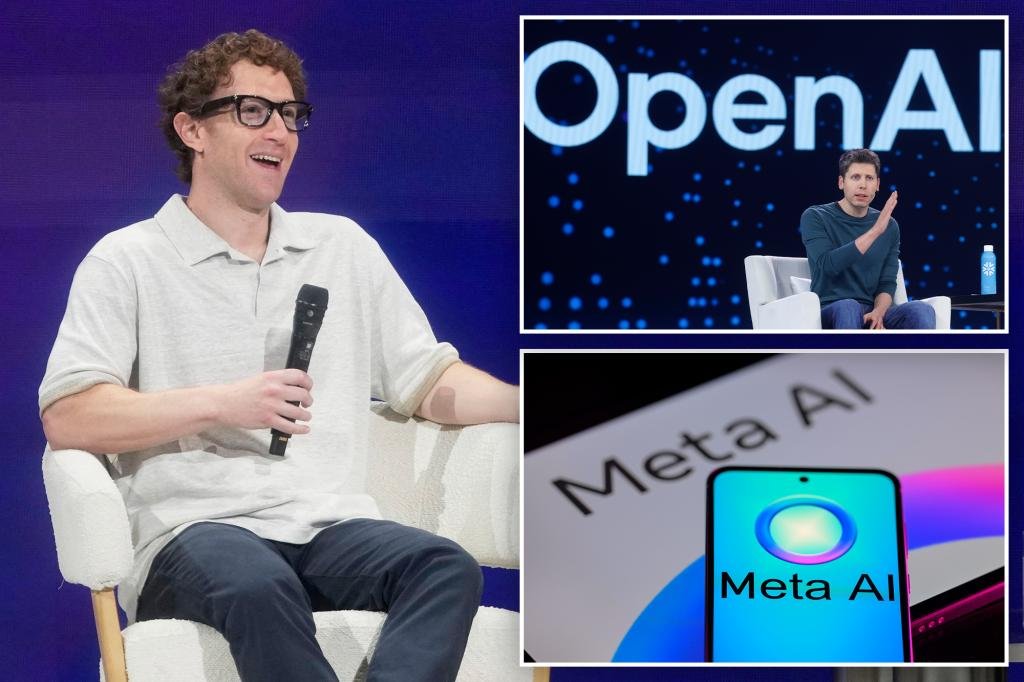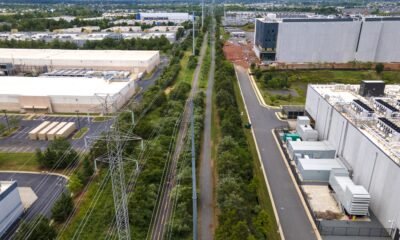AI Insights
Meta denies report CEO Mark Zuckerberg offered AI talent up to $300M

Meta on Wednesday pushed back on reports that the Mark Zuckerberg-led company has offered as much as $300 million to poach talent from OpenAI in the battle for artificial intelligence supremacy.
Zuckerberg allegedly extended the highly lucrative offers to at least 10 staffers at OpenAI who were given the option of taking equity in Meta — with $100 million of the stock vesting in the first year and up to $300 million over four years, online tech news site Wired reported.
A Meta spokesperson laughed off the eye-popping offers, noting that the pay packages would dwarf the annual compensation paid last year to some of Big Tech’s most prized top executives, including Uber CEO Dara Khosrowshahi ($39.4 million) and Microsoft boss Satya Nadella ($79.1 million).
“These statements are untrue — the size and structure of these compensation packages have been misrepresented all over the place,” Meta spokesperson Andy Stone told The Post.
“Some people have chosen to greatly exaggerate what’s happening for their own purposes.”
The Post has sought comment from Wired.
Meta has hired at least eight researchers from OpenAI in recent weeks, according to multiple reports.
The confirmed hires include high-level personnel who played key roles in the development and training of OpenAI’s artificial intelligence models.
The newly confirmed Meta recruits are Shengjia Zhao, Jiahui Yu, Shuchao Bi, Hongyu Ren, Trapit Bansal, Lucas Beyer, Alexander Kolesnikov and Xiaohua Zhai.
Several sources suggest the number of defections could be slightly higher.
Every morning, the NY POSTcast offers a deep dive into the headlines with the Post’s signature mix of politics, business, pop culture, true crime and everything in between. Subscribe here!
Four of the most recent hires — Zhao, Yu, Bi, and Ren — joined Meta’s new Superintelligence unit, which is led by Alexandr Wang.
Three others — Beyer, Kolesnikov, and Zhai — previously worked at OpenAI’s Zurich office. Bansal joined earlier in June.
OpenAI CEO Sam Altman has slammed Zuckerberg’s aggressive sales pitch, telling employees that Meta “is acting in a way that feels somewhat distasteful.”
“Meta has gotten a few great people for sure, but on the whole, it is hard to overstate how much they didn’t get their top people and had to go quite far down their list,” Altman wrote on a Slack message to employees that Wired said it had viewed.
Altman said that Meta had been “trying to recruit people for a super long time, and I’ve lost track of how many people from here they’ve tried to get to be their Chief Scientist.”
“I am proud of how mission-oriented our industry is as a whole; of course there will always be some mercenaries,” the OpenAI chief wrote.
Over the weekend, OpenAI’s top research officer sent a memo to staffers vowing that the company would go toe-to-toe with Meta in the battle for top talent.
Mark Chen, OpenAI’s chief research officer, sent the memo just after Zuckerberg managed to successfully lure four senior researchers.
“I feel a visceral feeling right now, as if someone has broken into our home and stolen something,” Chen wrote in the memo obtained by Wired.
“Please trust that we haven’t been sitting idly by.”
Chen wrote that he and Altman were working “around the clock to talk to those with offers” and that “we’ve been more proactive than ever before, we’re recalibrating comp, and we’re scoping out creative ways to recognize and reward top talent.”
Altman has also touted his own firm to prospective defectors.
“I believe there is much, much more upside to OpenAl stock than Meta stock,” he wrote.
“But I think it’s important that huge upside comes after huge success; what Meta is doing will, in my opinion, lead to very deep cultural problems. We will have more to share about this soon but it’s very important to me we do it fairly and not just for people who Meta happened to target.”
Zuckerberg is making a bold push to put Meta, the parent company of Facebook and Instagram, at the forefront of artificial intelligence with last week’s launch of Meta Superintelligence Labs (MSL), a new unit focused on building AI systems with human-level or greater reasoning capabilities.
Meta invested $14.3 billion in Scale AI, acquiring a 49% stake as part of its artificial generative intelligence strategy.
Alexandr Wang, former CEO of Scale AI, came aboard to become Meta’s first chief AI officer, while Nat Friedman, ex-GitHub CEO, was added to lead AI products.
AI Insights
Goldman Sachs Warns An AI Slowdown Can Tank The Stock Market By 20%

Artificial intelligence has propelled the stock market to all-time highs, but Goldman Sachs (NYSE:GS) recently warned that once AI spending slows down, the stock market can tank by 20%. A research note from Goldman Sachs Analyst Ryan Hammond cited the danger of hyperscalers inevitably cutting back on AI expenditures, according to Fortune.
“A reversion of long-term growth estimates back to early 2023 levels would imply 15% to 20% downside to the current valuation multiple of the S&P 500,” Hammond reportedly wrote in his research note.
Don’t Miss:
Right now, AI spending is full steam ahead, but Hammond wrote that a few analysts are assuming that a sharp deceleration will take place in Q4 2025 and 2026.
Tech giants haven’t gotten the memo. Meta Platforms (NASDAQ:META) said this week it will spend $600 billion on AI over the next three years. Zuckerberg later posted on Threads that it’s possible the company will invest more than $600 billion during those three years. He even said a “significantly higher number” was likely through the end of the decade.
Microsoft (NASDAQ:MSFT) made another big AI deal this week by securing a five-year, $17.4 billion AI infrastructure deal with Nebius (NASDAQ:NBIS). This type of rapid spending indicates AI growth can continue beyond the current rally.
Trending: ‘Scrolling To UBI’ — Deloitte’s #1 fastest-growing software company allows users to earn money on their phones. You can invest today for just $0.30/share.
Artificial intelligence plays a critical role in the stock market’s performance based on the top companies in major benchmarks like the S&P 500 and Nasdaq. Data from Slickchart shows that top AI beneficiary Nvidia (NASDAQ:NVDA) makes up approximately 7% of the S&P 500.
The top eight publicly traded corporations on the S&P 500 are all heavily invested in artificial intelligence. They are ramping up their AI spending and aim to release products and services that use AI. These eight companies make up more than 36% of the S&P 500.
There are also corporate giants outside of the S&P 500’s top 10 that still invest heavily in artificial intelligence. Oracle (NYSE:ORCL), Palantir (NASDAQ:PLTR), and Cisco (NASDAQ:CSCO) are some of the most notable S&P 500 members in the category.
AI Insights
A Sample Grant Proposal on “Artificial Intelligence for Rural Healthcare” – fundsforNGOs
AI Insights
Robinhood CEO says just like every company became a tech company, every company will become an AI company

Earlier advances in software, cloud, and mobile capabilities forced nearly every business—from retail giants to steel manufacturers—to invest in digital transformation or risk obsolescence. Now, it’s AI’s turn.
Companies are pumping billions of dollars into AI investments to keep pace with a rapidly changing technology that’s transforming the way business is done.
Robinhood CEO Vlad Tenev told David Rubenstein this week on Bloomberg Wealth that the race to implement AI in business is a “huge platform shift” comparable to the mobile and cloud transformations in the mid-2000s, but “perhaps bigger.”
“In the same way that every company became a technology company, I think that every company will become an AI company,” he explained. “But that will happen at an even more accelerated rate.”
Tenev, who co-founded the brokerage platform in 2013, pointed out that traders are not just trading to make money, but also because they love it and are “extremely passionate about it.”
“I think there will always be a human element to it,” he added. “I don’t think there’s going to be a future where AI just does all of your thinking, all of your financial planning, all the strategizing for you. It’ll be a helpful assistant to a trader and also to your broader financial life. But I think the humans will ultimately be calling the shots.”
Yet, Tenev anticipates AI will change jobs and advised people to become “AI native” quickly to avoid being left behind during an August episode of the Iced Coffee Hour podcast. He added AI will be able to scale businesses far faster than previous tech booms did.
“My prediction over the long run is you’ll have more single-person companies,” Tenev said on the podcast. “One individual will be able to use AI as a huge accelerant to starting a business.”
Global businesses are banking on artificial intelligence technologies to move rapidly from the experimental stage to daily operations, though a recent MIT survey found that 95% of pilot programs failed to deliver.
U.S. tech giants are racing ahead, with the so-called hyperscalers planning to spend $400 billion on capital expenditures in the coming year, and most of that is going to AI.
Studies show AI has already permeated a majority of businesses. A recent McKinsey survey found 78% of organizations use AI in at least one business function, up from 72% in early 2024 and 55% in early 2023. Now, companies are looking to continually update cutting-edge technology.
In the finance world, JPMorgan Chase’s Jamie Dimon believes AI will “augment virtually every job,” and described its impact as “extraordinary and possibly as transformational as some of the major technological inventions of the past several hundred years: think the printing press, the steam engine, electricity, computing, and the Internet.”
-

 Business2 weeks ago
Business2 weeks agoThe Guardian view on Trump and the Fed: independence is no substitute for accountability | Editorial
-
Tools & Platforms1 month ago
Building Trust in Military AI Starts with Opening the Black Box – War on the Rocks
-

 Ethics & Policy2 months ago
Ethics & Policy2 months agoSDAIA Supports Saudi Arabia’s Leadership in Shaping Global AI Ethics, Policy, and Research – وكالة الأنباء السعودية
-

 Events & Conferences4 months ago
Events & Conferences4 months agoJourney to 1000 models: Scaling Instagram’s recommendation system
-

 Jobs & Careers2 months ago
Jobs & Careers2 months agoMumbai-based Perplexity Alternative Has 60k+ Users Without Funding
-

 Podcasts & Talks2 months ago
Podcasts & Talks2 months agoHappy 4th of July! 🎆 Made with Veo 3 in Gemini
-

 Education2 months ago
Education2 months agoVEX Robotics launches AI-powered classroom robotics system
-

 Education2 months ago
Education2 months agoMacron says UK and France have duty to tackle illegal migration ‘with humanity, solidarity and firmness’ – UK politics live | Politics
-

 Podcasts & Talks2 months ago
Podcasts & Talks2 months agoOpenAI 🤝 @teamganassi
-

 Funding & Business3 months ago
Funding & Business3 months agoKayak and Expedia race to build AI travel agents that turn social posts into itineraries

















